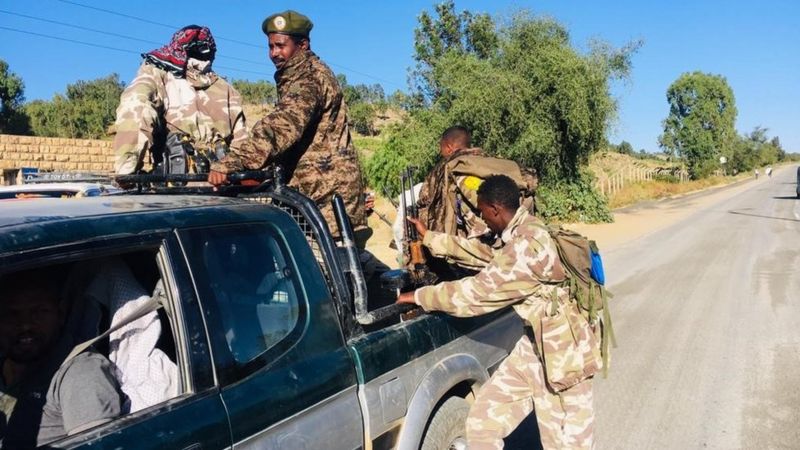Ethiopia's Prime Minister Abiy Ahmed says there have been airstrikes on military targets in Tigray state, whose leaders have fallen out with the national government.
But there has been no confirmation that the targets have been hit.
Tigray's governing party said on Thursday that there had been airstrikes but a senior official told the BBC that nothing had happened on Friday.
Some fear this could be the start of a civil war.
Long-standing tension between Ethiopia's federal government and Tigray, the country's northernmost state, boiled over into clashes this week.
The head of the United Nations has called for an "immediate de-escalation of fighting".
What did the prime minister say?
Speaking on the Ethiopian Broadcasting Corporation, Mr Abiy said airstrikes had happened on Thursday and Friday and would continue.
He said missiles, radar equipment and rockets had been destroyed, adding that the rockets had a range of 300km (186 miles).
Earlier, speaking on state television in Tigrinya, the language of the Tigray region, AFP news agency quotes the prime minister as saying that "these air strikes aren't aimed at civilians but rather at targets stored by this dangerous group".
He was referring to the Tigray People's Liberation Front (TPLF), which governs the state, and the weapons that it allegedly holds.
But officials in Tigray have denied to the BBC that an air attack took place on Friday.
In a statement earlier on Friday, Mr Abiy insisted that the military operation in Tigray had "clear, limited and achievable objectives".
Tigrayan leader Debretsion Gebremichael previously accused Mr Abiy's administration of plotting to invade the state.
What's the latest with the fighting?
Details are scanty as very little confirmed information is getting out, but on Thursday Mr Debretsion said there had been clashes in the west of Tigray.
Ethiopia's federal army is sending more troops to the region, according to Gen Berhanu Jula, deputy army chief of staff, who said they were being mobilised from across the country.
That's to provide support for the Northern Command, which is based in Tigray and whose base was captured by the TPLF.
Gen Berhanu has accused regional troops loyal to the TPLF of treason.
This came after Mr Debretsion said his troops had seized "almost all" of the weaponry at the Command.
A statement from the prime minister's office on Friday said that under the six-month state of emergency he declared in the region, a new taskforce under the control of the military chief of staff would have the power to:
disarm any regional security force
impose travel restrictions
impose a curfew
detain suspects engaged in illegal activities that endanger the constitutional order
use proportional force to restore law and order
How are things in Tigray?
It is difficult to know how intense the clashes have been and how many people have been killed.
That's partly because the internet and phone lines have been cut off in Tigray. However, electricity has now been restored to the region.
On Friday, schools and shops in the regional capital, Mekelle, were open, and transport services to other towns have resumed, but local residents say there is a sense of fear over what the coming days may bring.
What's this all about?
Tension has been mounting for some time as relations between the TPLF and the federal government have deteriorated.
The TPLF used to be the dominant force in Ethiopia's ruling coalition but its power has waned since Mr Abiy became prime minister in 2018.
Last year, he dissolved the ruling coalition, made up of several ethnically based regional parties, and merged them into a single, national party, the Prosperity Party, which the TPLF refused to join.
Friday morning's statement from the prime minister's office also said that some members of the TPLF were "fugitives from justice" and suggested they opposed Mr Abiy's attempts to reform the way Ethiopia was run.
Relations took a significant turn for the worse after the TPLF held a regional election in September.
The Tigrayan authorities went ahead with the vote in defiance of a nationwide postponement that was put in place following the outbreak of coronavirus.
The federal government described that election for the Tigray parliament as "illegal".
The vote raised concerns that the TPLF was laying the groundwork for the creation of a breakaway state, with a parliament and government taking office without the blessing of the federal government.
The TPLF said that it was committed to keeping the region within Ethiopia, but insisted it would defend "self-rule" and oppose what it called Mr Abiy's attempt build a strong "unitary" state.
This week, Mr Abiy accused the TPLF of attacking the military base and sent in the Ethiopian military.
What are diplomats saying?
The UN Secretary General António Guterres said he was "deeply alarmed" and called for an "immediate de-escalation of fighting".
Previously, on Wednesday, amid the drama of the US election, US Secretary of State Mike Pompeo also called for an end to any fighting.
"We are saddened by the tragic loss of life and urge immediate action to restore the peace and de-escalate tensions... the protection of civilian safety and security is essential," he said in a statement.
The African Union, whose headquarters are in the Ethiopian capital, Addis Ababa, is pushing for talks but the government is not willing to negotiate, sources told the Reuters news agency.
BBC





